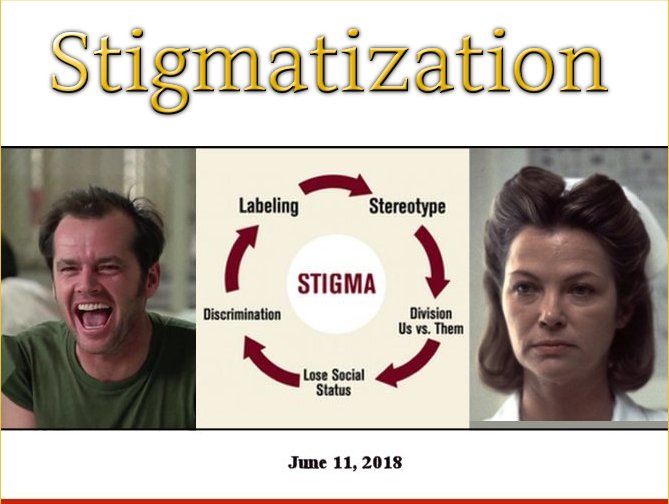


Like the common cold, mental illness affects everybody, yet there is a stigma attached to the later illness but not the former. Why is that? It is a curious bias. The reason we are the way we are is because we tend to judge other people through our own subjective eyes and that means we inadvertently misrepresent the character of other people because we notice their faults and ignore ours. That creates the distorted picture that we are OK but anybody who is unlike us is not. We value the ability to act rationally consequently, we label those whose mental capacity appears impaired and confused are frivolously assert they are potentially a threat to themselves and to others because they misrepresent reality. The truth is, their actual reality, like ours, is entirely subjective and they have as much right to be who they are as we have the right to be ourselves. Generally speaking, the belief that some people suffer from mental illness and others do not (and we are not talking about brain damage) is a delusion because we are essentially confusing the mere perception of what it means to be normal or intelligent with perceptions about mental health, and there is no scientific foundation for that. In our world, intelligence is not even a criterion for being Chief Justice, let alone President of the United States, so why would anybody use mere perception to stigmatize another? To the degree that everybody is prone to be unreasonable at some point, mental illness is a typical component of mental health, just like the common cold is a typical component of physical health. Consequently, we should doubt the mental stability of those who stigmatize rather than those who are stigmatized. After all, is it appropriate to blame or to make fun of the ill, in any capacity, for any condition which requires treatment and understanding, beyond all else? As a society, the only appropriate thing for us to do is to when we spot what we think is a mental challenge is to provide the assistance and support that is necessary and essential to help anybody who evidently suffers from n apperent physical or mental illness, to cope with whatever ails them/us. If we do not treat mental and physical illness in a similar manner it is because we are inappropriately dismissive. The line between rational and irrational thinking is very thin, it is crossed every single day without consequence and it should therefore not be a surprise that we live in a world that is essentially bat shit crazy, especially if we see it in others and not in our own doubts and challenges. We are talking about a common, human disease that afflicts everybody in one form or another and we should stop pretending otherwise. It is consequently quite clear that the stigma of mental illness must be replaced with the understanding that mental health is an issue of common and constant concern (like the common cold) and if we stigmatize anybody in that regard we are madder than we think. No need to doubt the fact we are all frequently delusional. Mental illness is fully occupied territory (because it afflicts everybody) and we will never erase the stigma through politically correct posturing. For example, the phrase "mental retardation" was replaced by "mentally challenged" and we have now gone a step above and beyond the call of duty, to bury every acknowledgement of mental illness through the catch-all phrase, "special needs". There is no such thing as "special needs". That person that we label should be assisted, not because he or she is a victim but because he or she deserves an equal playing field, and we do not have to stigmatize anybody to get it. Instead of pretending that mental health issues affect some but not others, we need to realistically accept our own faults and limitations before we are in a position to assess those of another. For that reason, mental illness is simply the realization that mental health is in fact about our own personal challenges, and when we stigmatize through thought, belief or action, it reflects more about us and less about them. Historically speaking, views about mental illness have not changed very much, we merely find a way to change the manner in which we demonize. The approach to dealing with the issue is certainly different, as we change our cultural views about what is appropriate and what is not, but the change is in fact cosmetic. We continue to demonize and to stigmatize those who are allegedly less normal than we are and it is simply lunacy to think that we are any better than we ever were in the past. Stigma will always be attached to mental illness if the perception that it is exclusively somebody else's infliction persists. As long as we fail to accept the fact that in some form or another, mental illness affects everybody and there is consequently no reason to perceive or to treat it differently from any other malady, we will never change. There is almost always a reason (except where serious brain damage is involved) people behave in an irrational fashion, most self-adjust without getting formal treatment and the tendency to isolate or to demonize perceived abnormalities (if that's what they are) is not acceptable. In most instances (and I repeat for emphasis) it is those who stigmatize rather than those who are stigmatized, who show signs of the most severe mental illness, and when that is widely acknowledged stigmatization will go away. History provides some interestig insights about mental illness. Plato's view that injustice is madness and that justice is health has some merit, as does his view that self-deception or ignorance of the self is a form of mental illness. Perhaps the modern equivalent of Plato's vision is the common, psychological view that self-knowledge is the best form of therapy, and judging from the fact that most people survive without formal therapy, there is merit in that view as well. Most people survive what we classify to be mental illnesses through mere destraction, they never develop a complete understanding of what ails them and in the vast majority of cases, life goes on without acknowledging any deeper insight -and that's okay for the most part. Another interesting view tht Plato held was that the drive for power, great pride and overwhelming passion are a form of mental illness, and that certainly widens the field of the afflicted, beyond current, conventional wisdom. Unfortunately, with education and commonly shared knowledge on the decline, it is becoming more and moe complicated to recognize the clear difference between fact and delusion because extreme partisanship destroys the willingness to drop bias and delusion is magnified and embraced when the brain is washed with dirty water. In today's divided world, the only reason we are not all mental patients is because we have erroneously accepted the view that our ideas are superior and those who disagree with us are inferior and we all stand our ground no matter what. The movie, One Flew Over The Cuckoo's Nest brilliantly illustrates the arrogance of those who cling to their own grasp of reality as if it is the only legitimate version. A sharp indictment of the Establishment urge to conform and an earnest rejection regarding the socio-political appropriation of madness, when you watch it, it is impossible to avoid the conclusion that the inmates of the mental institution are essentially humane while those who confine them are oppressive and tyrannical. Psychiatrist, Dr. Thomas Szasz parallels the sentiment of the movie when he calls mental illness a double impersonization. Mental patients impersonate the sick role and physicians who claim they can treat the illness play role of a medical therapist. Like the movie One Flew Over The Cuckoo's Nest, the reality that Dr. Szasz portrays confirms the obvious: Stigma dehumanizes and devalues a person's social identity and disqualifies the person from social acceptance. And that is why it is therefore necessary and essential to completely eradicate the tendency to stigmatize.
Next: Study history to be able to assess the present. |

